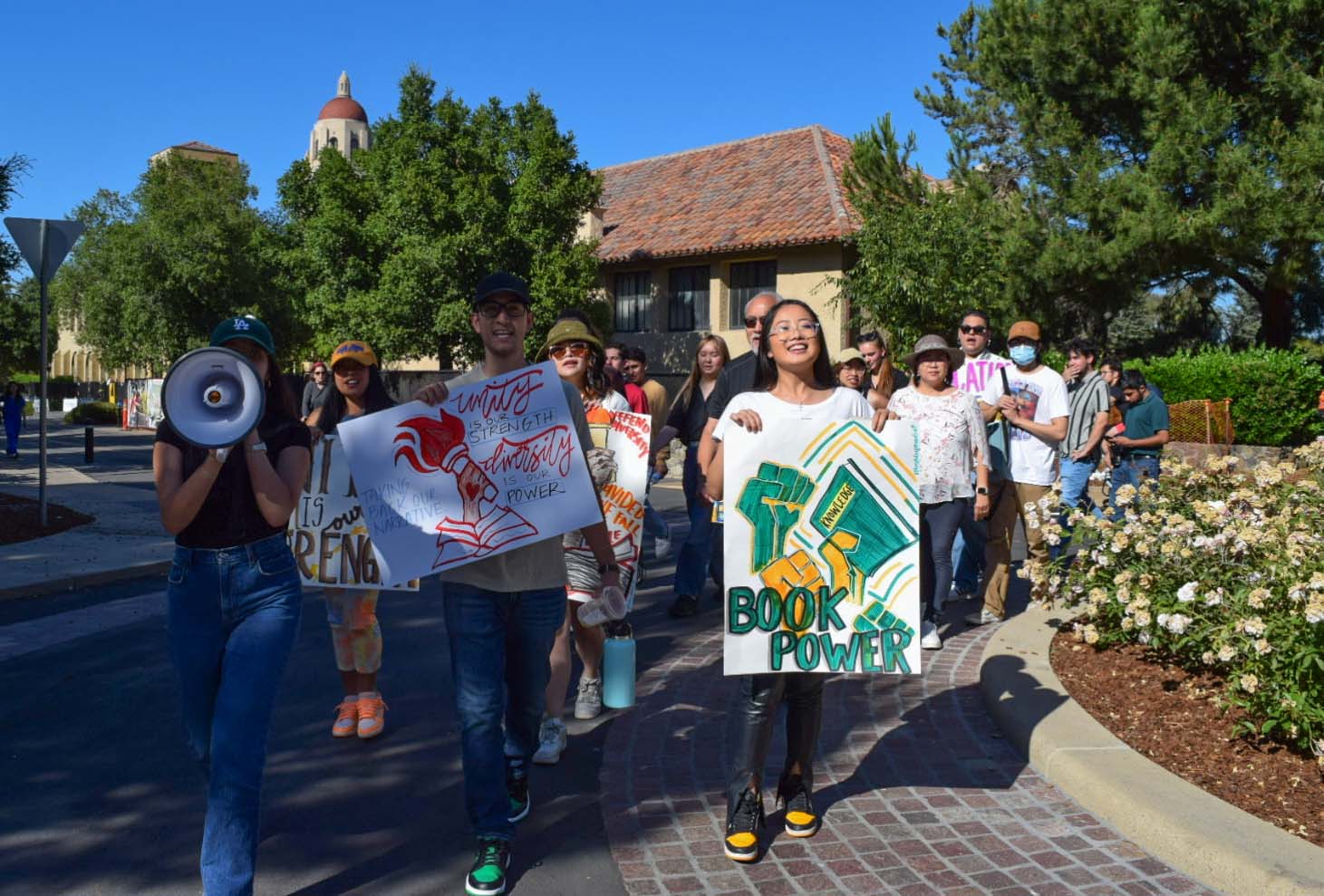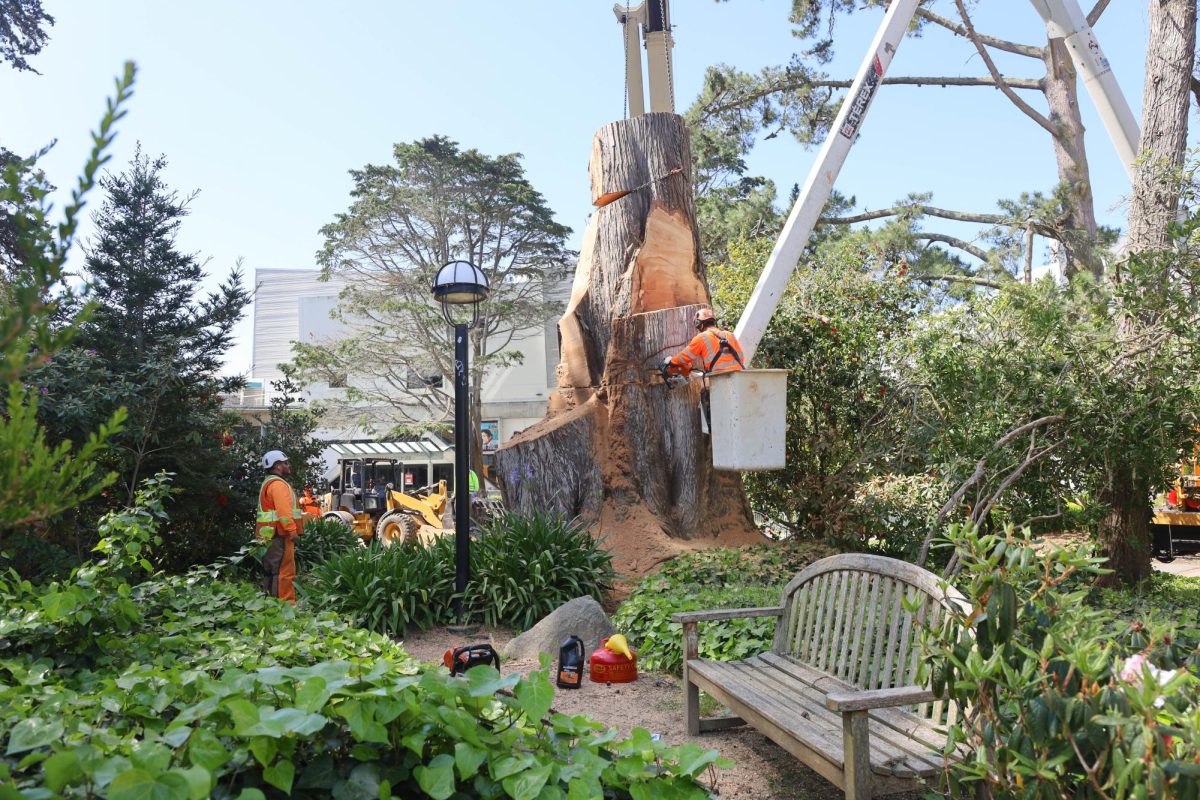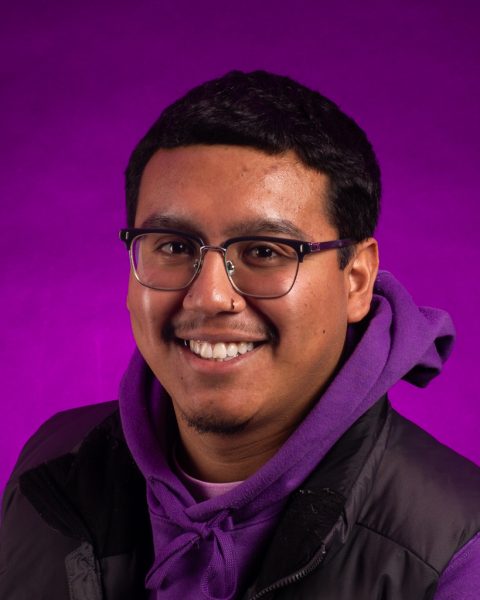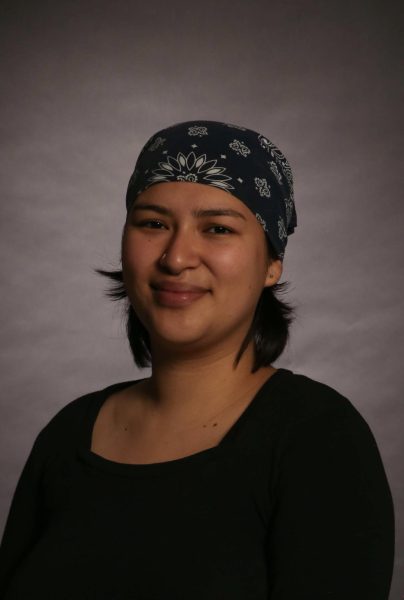A protest led by Nina Chuang, a San Jose State University alumni and former Associated Students President, was held at Stanford University’s White Memorial Plaza on Wednesday regarding the Supreme Court’s recent ruling to overturn affirmative action that denounced race as a factor in college admissions.
The SCOTUS ruled last Thursday that race shall no longer be a factor when considering students for admission into universities. This came to fruition when two lawsuits titled Students for Fair Admissions v. President and Fellows of Harvard College and Students for Fair Admissions v. The University of North Carolina deemed that including race in admissions unconstitutional.
Salma Pacheco, a Sacramento State University alumnus and former Associated Students President, collaborated with Chuang to organize the protest — Unity is our Strength, Diversity is our Power: Demanding Fair Representation in Higher Education — with the assistance of other AS members across California university campuses.
During the protest, Iese Esera, the Chief of Staff and Chair of AS at San Francisco State University, Ashmita Ahluwalia, former AS President of CSU East Bay, and Shawki Moore, a recent alumnus of San Diego State University and former AS President, delivered speeches advocating for equitable representation in higher education.
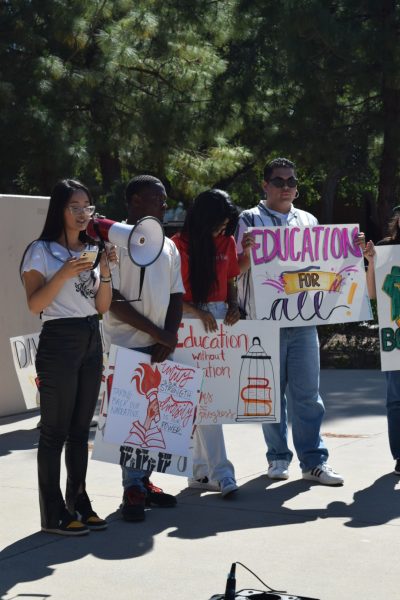
“I remember having this idea and in the beginning, I thought, you know — schools over summer vacation — but I felt this inner fire,” Chuang said. “I’m super-empowered, thankful, and blessed for the turnout today. There’s a lot of commitment from the students who came out who really are encouraged and motivated to make a statement about this.”
During her time at San Jose State, Chuang learned about the history of Stanford University, which led to the decision to hold the protest at Stanford, where students and residents may be more politically aware.
“Stanford University is built on the blood and work of Chinese American immigrants who worked on the transcontinental railroad,” Chuang said. “Leland Stanford, who founded this university, got a majority of his wealth from the railroad and was in support of a bill that also restricted Chinese American immigrants from working in the United States.”
Stanford is one of the most prestigious universities in the country, located in the heart of Silicon Valley. The campus has a history of activism regarding women’s suffrage, anti-war demonstrations, and most recently, Black Lives Matter protests. In fall 2022, the university’s undergraduate population consisted of 26% Asian and White students, 18% Hispanics and 7% African Americans.
During her speech, Pacheco expressed her frustration about having to fight a battle already fought for generations, claiming that nothing has changed with our system.
“I’m tired of repeating the same narrative over and over again. When am I going to feel safe in this country and be welcomed anywhere I go,” Pacheco told the protestors. “All of these amazing people [on stage] are in a minority group who have suffered just as much as me, and we are tired of it.”
Pacheco drove three hours from Sacramento to support her friend, Chuang. Both of them began planning the protest as soon as the ruling was announced.
“There’s something about being a minority and a woman that when you get together with like-minded individuals, you come together to support one another,” Pacheco said. “It’s very comforting, and it ultimately pushes you to be even better. It gave us the power to be our authentic selves.”
Moore flew in from San Diego to attend Chuang’s protest. Moore and Chuang both previously collaborated in the California State Student Association. The CSSA is a student-led organization helping all CSU students engage in system-wide, state and federal higher education policy-making.
While speaking, Moore referred to the SCOTUS, stating that institutions considering race for admissions are against the 14th Amendment. The 14th Amendment grants citizenship to all persons born or naturalized in the United States, including formerly enslaved people, and provides all citizens equal protection under the laws.
“The 14th Amendment was created to bring enslaved Black people to the same level as a normal person,” Moore said. “We have been historically marginalized. Why would we have the same opportunity as someone who has been historically pushed up on the backs of minorities?”
This law was created to grant enslaved people protected civil rights due to southern states attempting to limit their rights after the civil war. During Moore’s speech, he spoke about the unequal opportunities granted to communities of color.
“If I go to high school, we do not have the same access to education,” Moore said. “I don’t have access to the best tutors, I have to work two jobs to help my family, yet you’re telling me my 3.6 GPA is not the same as somebody that has a 4.0 GPA. That’s BS.”
Maileen Mamaradlo, a San Jose State alumnus, works in mental health programs due to suicide being a leading cause of death for Asian American youth. She spoke about education being the key to breaking generational cycles.
“For me, affirmative action is leveling out the playing field for people like me to be in higher education universities like Stanford, Harvard or other prestigious universities, not just within the CSU system,” Mamaradlo said. “I will never forget the amount of shame I had when I saw all my other white counterparts get into these schools so easily. And here I was feeling so much shame when in reality It wasn’t my fault but the system’s fault.”
Mamaradlo was rejected from the UCs she applied to. It wasn’t until she enrolled in San Jose State that she felt comfortable speaking about her mental health and how important it is to prioritize herself over others.
“Higher education is a way for people of color to break all of these cycles of trauma and a way to escape poverty,” Mamaradlo said. “We should be able to have a better life for ourselves like the American dream we were supposed to have, but it feels like it’s not very attainable.”


